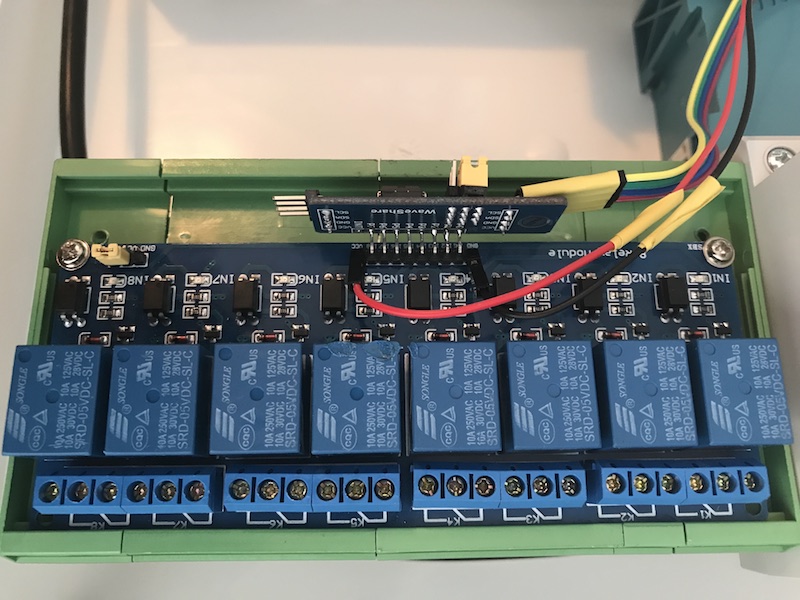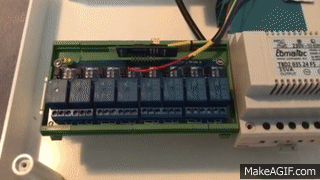I2CRelay is a small Python library that provides a simple API for controlling multiple relay boards that are connected to a PCF8574 I2C I/O expander.
This library was tested with the following hardware:
- PCF8574 I2C I/O Expansion Board (http://a.co/bdogwFe)
- SainSmart 8-Channel Relay Module (http://a.co/48AtFQ6)
You can solder these into a single unit like this:
To install the latest version from GitHub:
git clone -b master --single-branch https://github.com/oweidner/i2crelay.git
cd i2crelay
pip install --upgrade .
Together with the Python module installs the i2crelay command line tool:
Usage: i2crelay [OPTIONS] [CMDS]...
Control a PCF8574 I2C relay board.
Options:
--i2c-bus INTEGER The I2C bus (0 or 1) [required]
--i2c-addr TEXT The I2C device address, e.g. 0x20 [required]
--help Show this message and exit.
For example, run this command to switch on relay 1 and 2, switch off relay 3 and toggle relay 8:
i2crelay --i2c-bus=1 --i2c-addr=0x20 1:on 3:off 2:on 8:toggle
from i2crelay import I2CRelayBoard
# define I2C bus type
# 0: Raspberry Pi Model B Rev 1.0
# 1: Raspberry Pi Model B Rev 2.0, Model A, Model B+, Model A+, Raspberry Pi 2 Model B and Raspberry Pi 3 Model B
I2C_BUS = 1
# define I2C address of PCF8574 8-Bit I/O expander
# depends on the hardware pins A0 - A2
I2C_ADDR = 0x20
r1 = I2CRelayBoard(I2C_BUS, I2C_ADDR)
r1.switch_all_on()
time.sleep(1.0)
r1.switch_all_off()
time.sleep(1.0)
for relay in range(1, 9):
print("Switching relay {}".format(relay))
r1.switch_on(relay)
time.sleep(0.5)
r1.switch_off(relay)
time.sleep(0.5)
The code above should result in something like this:
The examples directory contains a few additional examples:
- rest_api.py - A simple REST API example with Flask
On Linux you can use the i2cdetect tool to figure out bus and device numbers:
To find out the I2C bus number, run:
i2cdetect -l
i2c-1 i2c bcm2835 I2C adapter I2C adapter
To find out the I2C device number, run:
i2cdetect -y 1
0 1 2 3 4 5 6 7 8 9 a b c d e f
00: -- -- -- -- -- -- -- -- -- -- -- -- --
10: -- -- -- -- -- -- -- -- -- -- -- -- -- -- -- --
20: 20 -- -- -- -- -- -- -- -- -- -- -- -- -- -- --
30: -- -- -- -- -- -- -- -- -- -- -- -- -- -- -- --
40: -- -- -- -- -- -- -- -- -- -- -- -- -- -- -- --
50: -- -- -- -- -- -- -- -- -- -- -- -- -- -- -- --
60: -- -- -- -- -- -- -- -- -- -- -- -- -- -- -- --
70: -- -- -- -- -- -- -- --
The user running the scripts needs access to the i2c devices in the Linux device tree. Instead of running the scripts as root you can add your user to the i2c group.
This program is free software; you can redistribute it and/or modify it under the terms of the GNU General Public License as published by the Free Software Foundation; either version 2 of the License, or (at your option) any later version.

